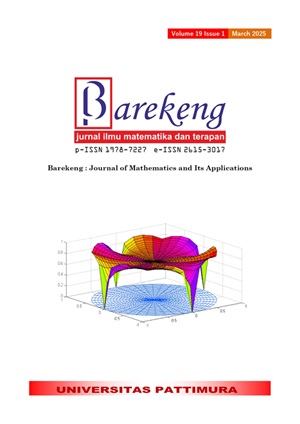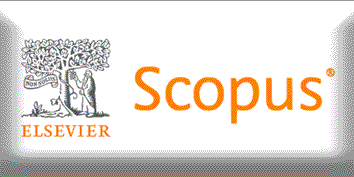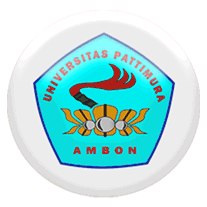THE SUFFICIENT AND NECESSARY CONDITIONS FOR A MODULE TO BE A WEAKLY UNIQUE FACTORIZATION MODULE
Abstract
T A torsion-free module over an integral domain is called Unique Factorization Module (UFM) if satisfied some conditions: (1) Every non-zero element has an irreducible factorization, that is , with are irreducible in and is irreducible in , and (2) if are two irreducible factorizations of , then in , and we can rearrange the order of the ’s so that in for every . The definition of UFM is a generalization of the concept of factorization on the ring which is applied to the module. In this study, we will discuss another definition that is a generalization of UFM, namely by the Weakly Unique Factorization Module (w-UFM). First, some concepts that play an important role in defining w-UFM are given. After that, the definition and characterization of w-UFM is also given. The results of this study will provide the sufficient and necessary conditions of the w-UFM.
Downloads
References
A.-M. Nicolas, “Modules factoriels,” Seminiare Dubrell-Pisot, vol. 20, pp. 1–12, 1967, [Online]. Available: http://www.numdam.org/conditions
A. Nikseresht and A. Azizi, “On factorization in modules,” Commun Algebra, vol. 39, no. 1, pp. 292–311, Jan. 2010, doi: 10.1080/00927870903527535.
C.-P. Lu, “Factorial Modules,” Rocky Mt J Math, vol. 7, no. 1, 1977.
D. D. Anderson and S. Valdes-Leon, “Factorization in commutative rings with zero divisors,” Rocky Mt J Math, vol. 26, no. 2, 1996.
D. D. Anderson and S. Valdes-Leon, “Factorization in Commutative Rings with Zero Divisors, II,” in Factorization in integral domains, Routledge, 2018, pp. 197–219. doi: 10.1201/9780203756263-7.
D. L. Costa, “Unique Factorization in Modules and Symmetric Algebras,” Trans Am Math Soc, vol. 224, no. 2, 1976.
D. S. Malik, J. N. Mordeson, and M. K. Sen, Fundamentals of Abstract Algebra,. New York: McGraw-Hill, 1997.
H. O. Kürşat, Ü. Tekir, and A. G. Aǧargün, “Weakly unique factorization modules,” Tamkang Journal of Mathematics, vol. 41, no. 3, pp. 245–252, 2010, doi: 10.5556/j.tkjm.41.2010.729.
S. Wahyuni, H. Marubayashi, I. Ernanto, and I. P. Y. Prabhadika, “On Unique Factorization Modules: A Submodule Approach,” Axioms, vol. 11, no. 6, Jun. 2022, doi: 10.3390/axioms11060288.
M. Alan and E. Özbulur, “On unique factorization modules,” International Journal of Pure and Applied Mathematics, vol. 108, no. 1, pp. 23–28, 2016, doi: 10.12732/ijpam.v108i1.4.
M. Roueentan and S. Namazi, “A Theorem on Unique Factorization Domains Analogue for Modules,” 2011.
W. A. Adkins Steven H Weintraub, Algebra: An Approach via Module Theory. Springer-Ferlag, 1992.
B. T. Stenstrom, “Pure submodules,” Arkiv for Matematik, vol. 7, no. 10, 1966.
M. A. Majid and D. J. Smith, “Pure Submodule of Multiplicational Modules,” Beitr a ge zur Algebra und Geometrie Contributions to Algebra and Geometry, vol. 45, pp. 61–74, 2004.
F. Farshadifar, “A Generalization of Pure Submodules,” Journal of Algebra and Related Topics, vol. 8, no. 2, pp. 1–8, 2020.
Copyright (c) 2025 I Putu Yudi Prabhadika, Sri Wahyuni

This work is licensed under a Creative Commons Attribution-ShareAlike 4.0 International License.
Authors who publish with this Journal agree to the following terms:
- Author retain copyright and grant the journal right of first publication with the work simultaneously licensed under a creative commons attribution license that allow others to share the work within an acknowledgement of the work’s authorship and initial publication of this journal.
- Authors are able to enter into separate, additional contractual arrangement for the non-exclusive distribution of the journal’s published version of the work (e.g. acknowledgement of its initial publication in this journal).
- Authors are permitted and encouraged to post their work online (e.g. in institutional repositories or on their websites) prior to and during the submission process, as it can lead to productive exchanges, as well as earlier and greater citation of published works.






1.gif)



